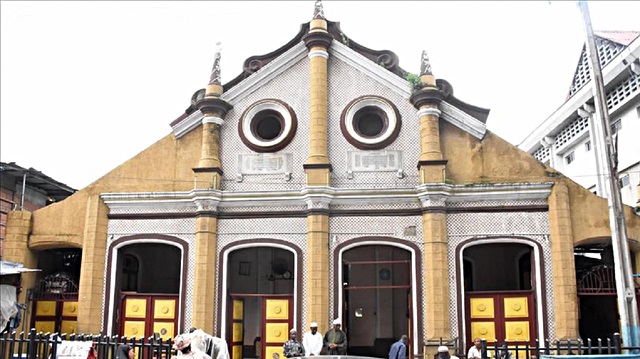
Shitta-Bey Mosque, built in 1891, named after financier Mohammed Shitta, honored by Ottoman sultan with the title 'bey'
Authorities at Nigeria’s first modern mosque in southwestern Lagos state have called for a partnership with the Turkish government in the running of the religious edifice, famed for its Ottoman-like architecture.
Estimated to cost £3,000 at the time, the Shitta-Bey Mosque was built in 1891 and commissioned in 1894 by dignitaries that included Abdullahi Quillam, a representative of Ottoman Sultan Abd-al-Hamid.
The mosque was named after Mohammed Shitta, the financier of the construction, whom the sultan honored with the title of “bey” for his contributions to Islam in the then-British colony of Lagos and elsewhere.
Born in 1824 in Sierra Leone, Shitta was said to have visited then-Ottoman Turkey in appreciation of his recognition.
At its commissioning, the mosque was deemed the most modern and costliest ecclesiastical edifice in British West Africa.
The Shitta-Bey mosque, one of Nigeria’s national monuments, retains its unique architecture and interior designs, which were credited to Senghor Baptista Da Costa.
“We will appreciate any support from the Turkish authorities especially in the area of providing cheap and renewable energy for the running of the mosque,” Sheikh Habeeballahi Taofeeq-Yushau, head of the historical mosque, told Anadolu Agency, mentioning the possibility of solar energy
“We will also appreciate scholarships for indigent Muslim students at the mosque.”
Explaining the title “bey,” the imam said it was a recognition of the role Mohammed played and the efforts of Ottoman Turkey to help the cause of Muslims and Islam across the world.
“The title was conferred on him at the official commissioning of the mosque on July 4, 1894. That is why he is known till today as Shitta Bey. He was reputed for his devotion to Islam and the affairs of Muslims,” said Sheikh Habeeballahi.
He said the Shitta family remains a pillar of the Islamic community in southwestern Lagos, where Mohammed’s descendants now take the title of Seriki n Musulumi (traditional head of Muslims).
Mohammed Shitta was the first to be conferred with the title.
The imam said the bey was also at the forefront of other Islamic efforts, including the clamor for the British colonial masters to let the Muslim community -- which formed half of the colony’s population -- have sharia as their own law, culminating in a petition to the British authorities in 1894.
Many historical accounts have confirmed the claim.


